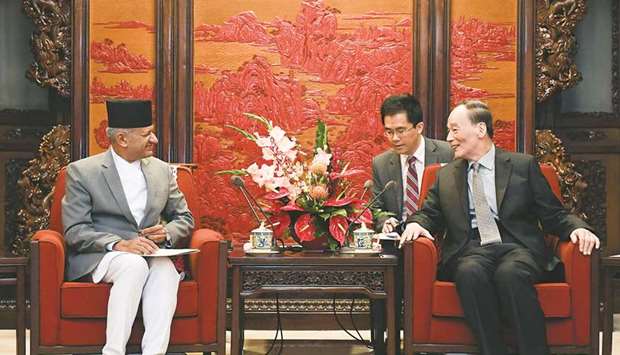During the meeting, Wang said China-Nepal relations enjoyed healthy development with steady progress in bilateral
co-operation in various fields.
“In China’s opening-up, reform and the socialist modernisation drive, a very important lesson is to properly handle the relationship between stability and development,” Wang said, adding that stability is the prerequisite for development, and development is the basis for
stability.
He said China is glad to see that Nepal has completed its political transition and shifted its focus to economic development.
Wang said he hopes the two countries can jointly implement the existing consensus and agreement and take the Belt and Road Initiative as an opportunity to expand all-around co-operation in order to promote bilateral ties to a new high.
For his part, Gyawali said Nepal and China are comprehensive co-operative partners, and the new government of Nepal will firmly pursue the one-China policy.
Speaking to reporters after meeting Gyawali yesterday, Chinese State Councillor Wang Yi dismissed the notion that Nepal had to carefully balance its
relations with China and India.
Nepal is a natural area for co-operation between China and India, Yi said, as he invited India to participate in connectivity projects between the three nations.
Nepal has traditionally looked to India for economic support and trade, but the Himalayan nation has increasingly been courted by China with transport deals, to New Delhi’s unease.
In 2016, Nepal sealed deals with Beijing to use Chinese roads and ports, seeking to reduce Nepal’s dependence on India for trade and transit.
While relations between China and India have been strained in recent years, with spats over everything from their disputed border with Tibet, current Indian Prime Minister Narendra Modi has sought to re-set ties and will visit China in June for a regional summit.
“I believe that China, Nepal and India are natural friends and partners. We are neighbours connected by the same mountains and rivers,” Yi said. “As we say in China, family members and neighbours wish each
other well.”
Support for Nepal’s development should be a common understanding between China and India, he added.
“Nepal stands as a natural beneficiary for co-operation and development from China and India. I think this is a logical desire that should be supported by both China and India,” Yi said.
China and Nepal have agreed to a long-term vision for a cross-Himalaya connectivity network, part of China’s Belt and Road Initiative, he added.
“We believe that such a network when well developed can also create conditions for an economic corridor connecting China, Nepal and India. We hope that such co-operation can contribute to the development and prosperity of all three countries.”
Gyawali, visiting Beijing about a week after Prime Minister KP Sharma Oli was in New Delhi, said he and Yi had agreed to start a feasibility study for a cross-border railway linking Nepal and China.
“Personally I have a dream, to travel to China from Nepal across the Himalayas in a modern train, enjoying the scenic beauty of the Himalayas,” he added.

